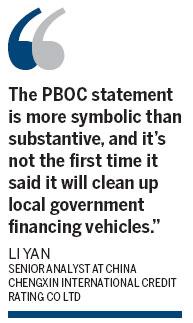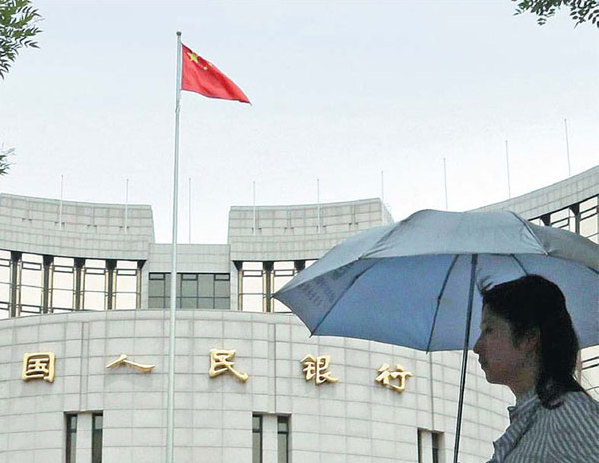Nation's central bank sets its sights on 'zombie' financing vehicles
Updated: 2014-01-18 08:00
By Zheng Yangpeng (China Daily)
|
||||||||
The People's Bank of China has reiterated its resolve to root out "zombie" local government financing vehicles this year and ensure that urbanization funding moves through standard market channels.
The central bank said in an online statement on Thursday that it will "exhaustively clean up" local government financing vehicles that "have poor credit, ambiguous functions and unsustainable financial conditions".
These vehicles are separate agencies created by local governments to finance massive spending on highways, stadiums or public works. Their creation followed the 2008 stimulus program that helped China rebound quickly from the global financial crisis and subsequent economic downturn.
|
The People's Bank of China said in an online statement on Thursday that it will "exhaustively clean up" local government financing vehicles that "have poor credit, ambiguous functions and unsustainable financial conditions". Provided to China Daily |
But analysts now believe that many LGFVs can't cover their debt payments. These entities were set up in haste, without any thought given to profitability, and the projects they backed don't generate sufficient revenue to make loan payments.
"The PBOC statement is more symbolic than substantive, and it's not the first time it said it will clean up LGFVs," said Li Yan, a senior analyst at China Chengxin International Credit Rating Co Ltd. "I assume specific rules will follow the pledge."
The central bank's statement was in line with that of the National Development and Reform Commission, which on Dec 31 said it will allow debt rollovers in an effort to avoid defaults by LGFVs.
Both statements were seen as confirming the belief that a growing number of LGFVs face repayment difficulties and will have to roll over their debt.
The NDRC's announcement came just one day after the National Audit Office's disclosure that China's local government debt and contingent liabilities had surged to 17.89 trillion yuan ($2.93 trillion) by the end of last June. That figure represented a 67 percent rise from previous audit results from the end of 2010.
Debt raised by LGFVs accounted for 39 percent of total debts, the NAO said.
Observers now worry that rising leverage among local governments poses risks to China's banking sector. Moody's Investors Service noted that although bank loans to LGFVs have grown only 19.5 percent since Dec 31, 2010, banks are likely indirectly exposed to relatively opaque non-bank financing structures, such as trust products.
Moreover, banks are investors in bonds issued by LGFVs.

Moody's singled out Bank of Communications Ltd and China CITIC Bank as being more exposed to rising government leverage, because they are big lenders to local governments.
But Li noted that direct loans to LGFVs by banks have already been curbed. Local governments have instead turned to shadow banks, which are lightly regulated and charge far higher rates.
To prevent further local government borrowing from shadow banks, China's regulators have said they'll allow more qualified local governments to go directly to the bond market.
The PBOC's latest statement said it will support LGFVs' moves to obtain finance through "standard market mechanisms" if they are "well-managed, with rigorous internal controls, have a clear function and are financially sustainable".
The PBOC is also "actively" making technical preparations for municipal bond issues. This is the first time that the Chinese government has said clearly that it will develop the nation's municipal bond market.
Traditionally, the Ministry of Finance was responsible for the issue and repayment of local government bonds.
Allowing local governments to issue municipal bonds means they will be directly responsible for their debt, a situation regarded by experts as the most effective way to rein in reckless borrowing.
Municipal bonds and property taxes are two key points of a "new urbanization funding plan" drafted by regulators, which could be released before the Lunar New Year, which starts on Jan 31, Caijing magazine reported. New policy financial institutions could also be set up, it said.
zhengyangpeng@chinadaily.com.cn
(China Daily 01/18/2014 page9)

 Spring Festival preparations across China
Spring Festival preparations across China
 Obama bans spying on leaders of US allies
Obama bans spying on leaders of US allies
 Bunnies on parade to celebrate 60 yrs of Playboy
Bunnies on parade to celebrate 60 yrs of Playboy
 Chipmunk fit to burst as it stuffs peanuts into mouth
Chipmunk fit to burst as it stuffs peanuts into mouth
 Wildfire out of control in Los Angeles, US
Wildfire out of control in Los Angeles, US
 Bull-taming festival kicks off in India
Bull-taming festival kicks off in India
 Way to art school
Way to art school
 'American Hustle,' 'Gravity' lead Oscar nominations
'American Hustle,' 'Gravity' lead Oscar nominations
Most Viewed
Editor's Picks

|

|

|

|

|

|
Today's Top News
The party is over for SOEs conferences
Obama's NSA overhaul too weak
Egypt referendum wins support
Home prices continue to climb
Tencent's Ma tops China rich list
Obama bans spying on leaders of US allies
US seeks nonexistent threat
Li delivers economic reform vow
US Weekly

|

|






